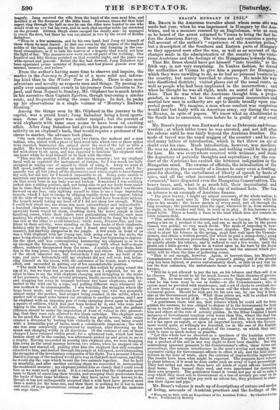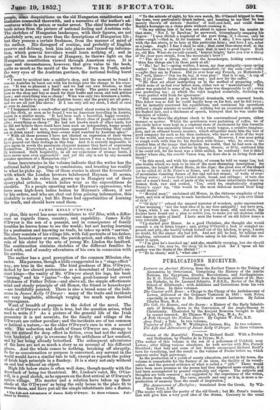BRACE'S HUNGARY IN 1851.* Mn. BRACE is the American traveller
about whom some stir was made last year, when he was imprisoned in Hungary by the Aus- trians, and in a measure rescued by an Englishman, who as soon as he heard of the arrest returned to Vienna to bring the fact be- fore the American Envoy. The volume not only contains a pretty full account of the author's " experience of the Austrian police," but a description of the Southern and Eastern parts of Hungary as they appeared soon after the war, as well as an account of the changes made in the administration of the country by the victo- rious Austrians and the feelings of the Hungarians towards them.
That Mr. Brace should have got himself " into trouble," as the Irish say, is not very surprising. In Yankee fashion, he forced the authorities at Vienna to give him a passport for Hungary ; which they were unwilling to do, as he had no personal business in the country, but merely travelled to observe. He made his way into disaffected districts; visited places out of the usual route, as well as people who had been implicated in the insurrection ; and when he thought he was all right, made no secret of his sympa- thies. That he was what the Austrians thought him, a propo- gandist, is untrue ; but in times of suppressed insurrection and martial law men in authority are apt to decide broadly upon sus- pected people. We imagine, a man whose conduct was suspicious would fare but badly with an American army, say during the war in Mexico, in spite of papers. We know what an Abolitionist in the South has to encounter, even before he is guilty of any overt act.
Mr. Brace's journey was Eastward as far as Debreczin and Gross- wardein ; at which latter town he was arrested, and not left after his release until he was fairly beyond the Austrian frontier. His mode of travel was the usual waggon of the country ; and he car- ried many letters of introduction, which in fact threw an air of doubt over his case. Much introduction, however, was needless. He was an American, a Itepublican, and nothing could be too good for him. He was everywhere received with welcome, and made the depository of patriotic thoughts and aspirations • for the con- duct of the Austrians has excited the bitterest indignation in the Hungarian mind. The swarms of officials, the introduction of the passport system, the necessity of a licence to carry even a fowling- piece for shooting, the curtailment of liberty of speech by hosts of spies, and all the other incessant interferences of " paternal go- vernment," have disgusted even the Hungarian Conservatives. The heavy taxes, and, what is as much felt, their inquisitorial and troublesome nature, have filled the cup of national hate. The tax on tobacco is an example of Austrian finance.
" The great luxury, I might say almost necessary, of the whole nation, is tobacco. Every man uses it. The clergyman walks the streets with his pipe in his mouth ; the bauer smokes at every meal, and all through the long evenings ; the gentleman plies the cigar, wherever he is, from morning to night, in fair weather and foul, in work or in play. It has become a na- tional habit. There is hardly a farm in the land which does riot contain its little tobacco-field.
" This article the Austrians determined to tax as a luxury. Whether im- posing a tax on a product of the soil, and one so much in use by the poorer classes, was politic, we very much doubt. The mode of imposing it, how- ever, and the amount of the tax, was most singular. The peasant, when about to plant his tobacco in the spring, must first wait upon the Commis- sioners, and obtain a written permit, (for which he paid a stamp-duty,) going through a very vexatious proceeding for a man in his situation. After this, he quietly plants his tobacco, and is suffered to rest a few weeks, until the plants are a little grown ; then he is waited upon in his turn by the Royal Commissioners, who assess the present amount, and the amount which pro- bably will be when the time of gathering comes.
"This is not enough, however. Again, at harvest-time, his Majesty's Commissioners show themselves at the peasant's paling, and if the present crop has been injured, or proves unfortunately short, or falls in any way be- low the first estimate; the unfortunate bauer is compelled to pay the dif- ference.
"Still he is not allowed to pay the tax on his tobacco and then sell it as he chooses. That would be far too much licence for their theories of govern- ment. No, he must carry all his tobacco—every fragment and leaf, even what he has been wont to use as fodder—to the Commissioners ; who of course must be provided with storehouses, and a set of clerks to overlook it— all new items of expense ; and there he must sell the whole crop at the Go- vernment prices. Should he wish any for his own use, he can buy it back, also at the Government prices. What those prices are, will be evident from this instance in the town of M—, in Heves Comitat. "A gentleman there told me, that tobacco which he could sell for forty gulden the zentner, he was obliged to dispose of to the Government for from seven to twelve the zentner ; which tobacco the Government again sold to him and others at the rate of seventy gulden. In the Bihar Comitat I heard instances of Government taxation even worse than this, where the dead loss to the planter would approach ninety per cent. And this, be it remembered, not a tax upon an export, or upon an imported luxury, which the Govern- ment would quite as willingly see banished, (as in the case of the English tax upon tobacco,) but upon a product of the country, on which they only wish to raise as much money as possible. "Let this whole law be observed as a specimen of the Austrian system, which they would so stupidly fasten upon Hungary. The very idea of tax- ing a product of the soil in any way ought to have been obsolete. But this summoning ignorant peasants to the Commissioner's office, these forms and proceedings, this minute interference in the man's sowing and reaping, the expensive outlay for Government-officers to effect it all, and the bold inter- ference in the laws of trade, show the extreme of impracticable legislation. The results have been what might be expected. The peasants have refused to plant tobacco, if it must be done under such an array of legal proceedings. They had rather not smoke than have all kinds of royal officers haunting their barns. They burned their seed, and were imprisoned for destroying their own property. The gentlemen found it would not pay at all to raise a crop which they must sell to Government at a loss of seventy per cent on its real value ; and rather than pay such an odious tax, they preferred to aban- don their cigars and pipe."
Mr. Brace's volume is made up of descriptions of nature and modes of living, accounts of Austrian practices and the feelings of the
• Hungary in 1851, with an Experience of the Austrian Police. By Charles Lorin; Brace. Published by Bentley
people, some disquisitions on the old Hungarian constitution and statistics connected therewith, and a narrative of the author's ad- ventures while in prison or under arrest. The chief interest of the book arises from the picture of national feeling and Austrian rule. The sketches of Hungarian landscapes, with their figures, are not absolutely new, any more than the descriptions of Hungarian life ; but they possess a certain freshness, from the manner of mind of the author. His disregard of routine, and probably of English reserve and delicacy, took him into places and turned-up informa- tion, which general travellers would learn nothing of; and in spite of his bias in favour of Hungary, he throws light on the Hungarian constitution viewed through American eyes. It is time and circumstances, however, that give value to the book, quite as much as the merit of the writer. Even in Pesth, under the very eyes of the Austrian garrison, the national feeling burst forth.
I went by accident into a saddler's shop, and the moment he found I was no Austrian he burst out with his feelings over the change in his coun- try. ' It was so pleasant a land ! and we had our own freedom, as they have now in America ; and Pesth was so lively. The gentry used to come here to the shop and buy so much for their hunts and races, and talk politics here ; and everything was so cheap ! Wine was only two kreutzers a bottle. But now we have to pay all the Austrian taxes ; and the gentry are all gone ; and we are all just like slaves ! If I can only sell my stock, I shall at once go over to America.'
" I happened into a coach-office and inquired about routes in the interior, and the clerk, as soon as he found I was an American travelling in Austria, began in a similar strain. It had been such a beautiful, happy country,' he said ; there could be nothing like it. Every class of people so comfort- able ; everything so cheap !' He had not known much of other lands, but he did not believe there could have been such an independent, happy people on the earth ! And now, everywhere oppressed ! Everything they could eat or drink taxed : nothing free—every word watched by Austrian spies!'
" With all these persons I have not elicited an expression of their views at all; but, in a moment, when they have known I was a foreigner, they have poured out their feelings in this way. And it is entirely impossible to give again in words the passionate eloquent manner they have of expressing themselves. Everywhere, as I mingle in society, an American is most heart- ily welcomed. Such hospitality, in all my experience of strange lands, I have never seen even approached : and yet the city is not by any means..' genuine specimen of a Hungarian city."
Some inaccuracies in the volume indicate that the writer has the national habit of jumping to conclusions, and trusting too readily to what he picks up. One of these stories is about the broomsticks with which the London brewers belaboured Hayman. It seems, quite a trade in relics has grown up in Hungary out of these apocryphal articles, which ladies wear as the superstitious do amulets. To a people smarting under Haynan's oppressions, who have seen high-born ladies beaten by Haynan's officers, if not by his orders, and who are shut out from gaining information, this credulity is natural ; but Mr. Brace had opportunities of learning the truth, and should have used them.



























 Previous page
Previous page